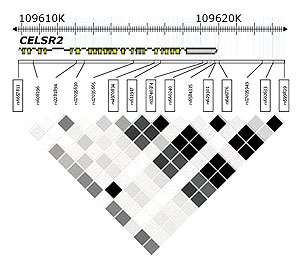Scientists reveal a new target to fight bad cholesterol

Scientists have uncovered a new region in the genome that is responsible for the body’s ability to regulate bad cholesterol which is linked to heart attack and stroke. Their findings are published in The Lancet.
The researchers found three genetic variations in the same region on chromosome 1 which were all linked to levels of LDL-cholesterol in the blood.
Teams from the Medical Research Council Epidemiology Unit, the Wellcome Trust Sanger Institute, Cambridge University and GlaxoSmithKline, studied data from large numbers of people across Europe. They looked at genome-wide scans of more than eleven thousand people to find out which genes affect LDL-cholesterol levels.
“While therapies exist to lower cholesterol levels in people whose levels are too high, much is still unknown about the mechanisms that underlie cholesterol regulation and why some people seem to produce more than others.
“Although what you eat is definitely a factor in your cholesterol levels and some bad cholesterol is dietary in origin, the majority of LDL-cholesterol is produced by the body. Performing a genome-wide study, looking for areas which are associated with cholesterol levels helps us to find out why some people produce more than others.
“We might be able to use this information to identify which people are particularly at risk of developing cholesterol problems. We can also look at the function of the genes involved and find out in what way someone may be having problems regulating bad cholesterol levels. This could help us to design more specific and appropriate treatments.”
Dr Manjinder Sandhu From the MRC Epidemiology Unit and Department of Public Health & Primary Care, Cambridge University, and lead researcher for the study
“This represents a mammoth statistical effort by teams in publicly-funded research establishments, the charitable sector and industry.”
“The collaborative spirit in which the research was carried out and the access to the data and expertise of academic and industry scientists has made this a particularly exciting project, generating solid data that provides novel insights into the regulation of cholesterol.”
Professor Nick Wareham Director of the MRC Epidemiology Unit
“GSK is looking for innovation to bring better medicines to patients. Breakthroughs when dealing with big clinical problems can only come out of open, highly collaborative science like this. GSK is committed to this partnership which it is hoped will yield further results.”
Professor Paul Matthews Vice-president of Clinical Pharmacology and Discovery Medicine, GlaxoSmithKline
“This region has been previously associated with coronary artery disease through the efforts of of the Wellcome Trust Case Control Consortium and Cardiogenics but the findings of this study push our understanding further revealing its implication in lipid levels.”
Dr Panos Deloukas Senior Investigator at the Wellcome Trust Sanger Institute, where part of the study was carried out
More information
Funding
The research was funded by the Medical Research Council, Wellcome Trust, British Heart Foundation (BHF), European Commission, and GlaxoSmithKline.
Publications:
Selected websites
GlaxoSmithKline
GlaxoSmithKline one of the world’s leading research-based pharmaceutical and healthcare companies is committed to improving the quality of human life by enabling people to do more, feel better and live longer.
Medical Research Council
The Medical Research Council (MRC) supports the best scientific research to improve human health. Its work ranges from molecular level science to public health medicine and has led to pioneering discoveries in our understanding of the human body and the diseases which affect us all.
British Heart Foundation
The British Heart Foundation (BHF) is the nation’s heart charity, dedicated to saving lives through pioneering research, patient care, campaigning for change and by providing vital information. But we urgently need help. We rely on donations of time and money to continue our life-saving work. Because together we can beat heart disease.
The Wellcome Trust Sanger Institute
The Wellcome Trust Sanger Institute, which receives the majority of its funding from the Wellcome Trust, was founded in 1992. The Institute is responsible for the completion of the sequence of approximately one-third of the human genome as well as genomes of model organisms and more than 90 pathogen genomes. In October 2006, new funding was awarded by the Wellcome Trust to exploit the wealth of genome data now available to answer important questions about health and disease.
The Wellcome Trust
The Wellcome Trust is a global charitable foundation dedicated to achieving extraordinary improvements in human and animal health. We support the brightest minds in biomedical research and the medical humanities. Our breadth of support includes public engagement, education and the application of research to improve health. We are independent of both political and commercial interests.


